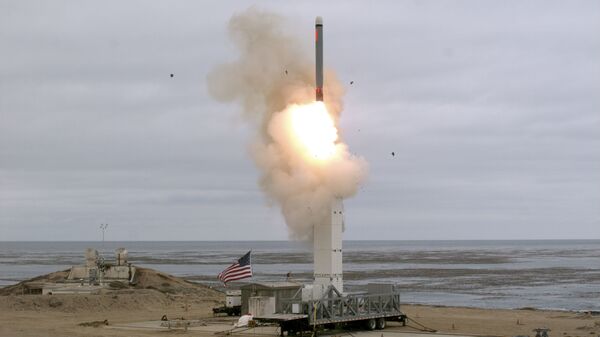In addition to funding for US President Donald Trump’s pet projects like the militarized border wall and a new branch of the US military dedicated to illegally militarizing outer space, the NDAA also lays out diplomatic punishments for US allies whose decisions have been judged to hurt US strategic interests, such as Turkey’s purchasing of S-400 air defense systems and Germany’s completion of the Nord Stream 2 gas pipeline from Russia.
According to Army-Technology, citing slightly smaller fiscal year 2019 numbers, the Pentagon’s budget is four times larger than the next-highest defense spender on the planet, China, and 25% larger than the nine other top 10 defense budgets combined.
Medea Benjamin, a peace activist and co-founder of Code Pink, told Radio Sputnik’s Loud and Clear Thursday her organization had pressured federal lawmakers extensively to adopt a slew of proposals that would have added significant restrictions on Trump’s power to declare war and to materially support wars by US allies, such as the Saudi-led war in Yemen and the development of a new low-yield nuclear weapon.
“The Democrats, at the last minute, caved in” on promises to back those additions, Benjamin said. She noted that as passed, the NDAA has “no checks on what that money would be used for … It’s more than the Pentagon even asked for!”
“I suppose it’s a testament that we don’t have enough of a grassroots base to really put the pressure on them to stop this constant increase in the money going to the military,” Benjamin told hosts Brian Becker and John Kiriakou.
The bill’s passage comes on the heels of a damning expose by the Washington Post’s Craig Whitlock of the Afghanistan Papers. In a December 9 story titled “At War with the Truth,” the Post described how confidential documents obtained by Freedom of Information Act requests revealed “that senior US officials failed to tell the truth about the war in Afghanistan throughout the 18-year campaign, making rosy pronouncements they knew to be false and hiding unmistakable evidence the war had become unwinnable.”
Benjamin noted how the papers show that “there was so much money going to the Pentagon that the [US military’s] people in Afghanistan didn’t even know what to do with it. They were literally just throwing it away because it was the ‘use it or lose it’ kind of thing,” whereby funds are cut from a budget if they remain unused, encouraging departments to find ways to spend their entire budgets even if they don’t have an immediate use for all the expenses.
“It happens every single year, and we know that Congress is so indebted to the weapons lobbyists and the jobs in their district. And you take one weapons system like the F-35, and I think it’s in 325 different congressional districts that they’re making a part for this plane that’s had the most terrific cost overruns and the worst performance, but yet we keep ordering more of them,” Benjamin noted.
“Trump is just crowing about this massive military budget and all he got, so this is definitely not a win for the Democrats, and it’s certainly not a win for the people,” Benjamin said of liberals’ attempts to claim small victories like paid parental leave in the bill made it “progressive,” as House Armed Services Committee Chairman Adam Smith (D-WA) attempted to cast it on Wednesday.
Smith’s fellow Democrat, Rep. Ro Khanna (D-CA), blasted the bill’s wasteful spending and massive increase over previous years’ totals.
This NDAA is anything but progressive.
— Rep. Ro Khanna (@RepRoKhanna) December 11, 2019
We need to vote no. pic.twitter.com/1kdgaZ7WDG
“This defense budget is $120 billion more than what [former President Barack] Obama left us with,” Khanna said Wednesday on the House floor. “That could fund free public college for every American. It could fund access to high-speed, affordable internet for every American. But it's worse. The bipartisan amendment to stop the war in Yemen: stripped by the White House. The bipartisan amendment to stop the war in Iran: stripped by the White House."
Democratic presidential candidate Senator Bernie Sanders’ (I-VT) senior adviser, Warren Gunnels, tweeted Wednesday that “every member of Congress who voted to give the most corrupt, unhinged, and unstable president in history $738 billion to fight endless wars, fund a bogus Space Force, and put our troops at risk must never tell us that we cannot afford Medicare for All or a Green New Deal.”
Benjamin noted that a new anti-war coalition that included the Poor People’s Campaign had come together in 2019 “to lay out precisely how we could cut $350 billion from the Pentagon, where it would come from,” which she noted included “closing half of the foreign bases, saving $80 billion there; winding down these wars in the Middle East; cutting the number of F-35s that we’ve ordered; and on and on.”
She noted this would “also make us safer, because let’s face it: having antagonistic bases in other people’s countries, where there’s super-pollution and problems with soldiers getting out of hand - that doesn’t make us safer.”



